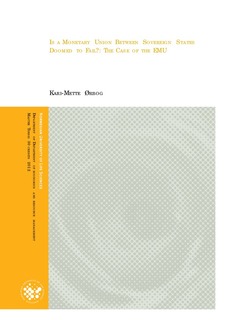| dc.description.abstract | The European Economic and Monetary Union (EMU) is a historic construction. It is a
monetary union among sovereign states that have surrendered their monetary policy and
entered a fixed exchange rate regime, while maintaining an autonomous fiscal policy. Internal
and external macroeconomic imbalances have developed between the member states since the
creation of the monetary union, but the effect of this development became more visible after
the financial crisis, as it led to some European states requiring emergency assistance from the
IMF and the EU.
This thesis studies whether the development of imbalances in three southern European
countries, namely Greece, Italy and Spain, were: (a) the result of purely domestic sources; (b)
the result of domestic difficulties amplified by EMU membership; or (c) the result of these
countries joining the EMU, regardless of their domestic state of affairs prior to membership.
The purpose is to understand what caused the imbalances to develop, as this has implications
for the long run survival of the EMU, as well as how to construct potential new monetary
unions between sovereign states.
The method used is a country-specific case study of Greece, Italy and Spain, highlighting
the differences and similarities of macroeconomic and microeconomic variables as well as
policies between the countries from 1992 until 2011. To reveal when the imbalances started to
develop the sample years have been divided into three periods: a pre-EMU, a core-EMU and a
crisis-response period. The results are discussed for each country to discover the sources of
the internal and external imbalances, and to evaluated whether the already suggest policy
measures will remedy and hinder reoccurrence of the current problems in the EMU.
The outcome of the case study is that the EMU membership amplified existing domestic
imbalances in Greece, Italy and Spain. This amplification happened due to the more
integrated financial market that led to the disappearance of the long-term interest rate spreads,
resulting in easier access to credit for the government. Italy and Greece took advantage of
this, while in Spain, the more integrated financial market caused the private sector to take on
excessive debt. Greece, Italy and Spain experienced higher cost growth relative to the other
EMU member countries, causing above average inflation and an appreciation of the real
exchange rate. The countries lost competitive power relative to the other EMU member states
and emerging markets. Identified sources of external imbalances were declining private and
public saving rates combined with increased investment that created balance of trade deficits.
Italy and Greece exemplify that a monetary union between sovereign states is doomed to
fail when the regulatory framework lacks strong sanction possibilities. This is due to moral
hazard on both the lending side, represented by the financial institutions, and on the
borrowing side, represented by the governments. The presented evidence suggests that stricter
financial regulation and firmer sanctions in the Stability and Growth Pact (SGP) are needed if the EMU is to survive in the long run, as the control mechanisms of the countries’ fiscal
policy were too weak, relative to the large negative spillover effects from reckless borrowing.
The policy implications that inform this, is that the EMU do not need to form a federal
state or a fiscal union to survive in the long run, if the new macroeconomic surveillance
regime as well as the SGP is obeyed to by all member states, in addition to implementation of
an EMU-wide financial regulation framework. The main findings of this study can be
generalized to other potential monetary unions in the making without a fiscal union, keeping
in mind the limited nature of examining only three of the current 17 EMU member states. | no_NO |
